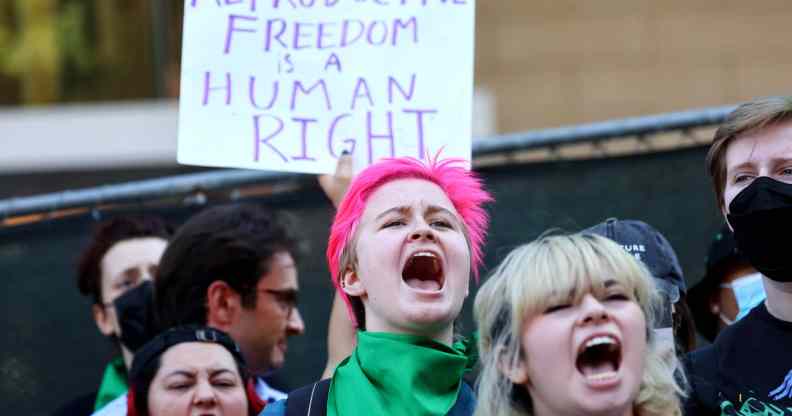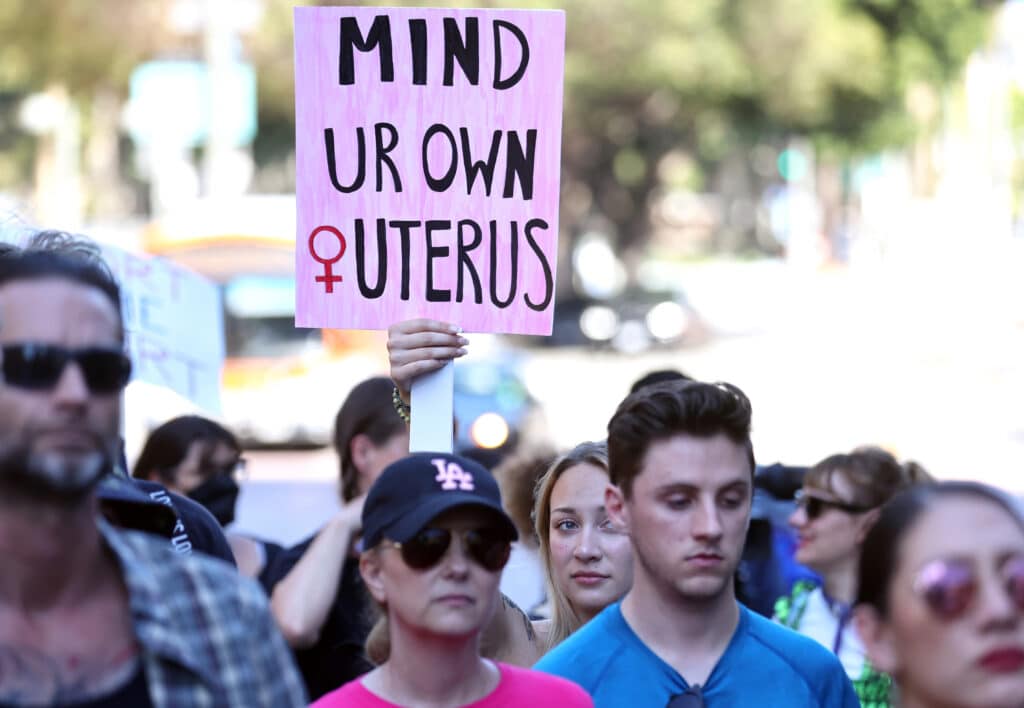Queer women and trans folk need abortion rights too: ‘We’re being left out of the conversation’

Abortion rights supporters protest in Los Angeles, California against the recent US Supreme Court decision to end federal abortion rights protections (Mario Tama/Getty Images)
Abortion rights supporters protest in Los Angeles, California against the recent US Supreme Court decision to end federal abortion rights protections (Mario Tama/Getty Images)
Members of the LGBTQ+ community in the United States have spoken out about their own abortion experiences after Roe v Wade was struck down.
The Supreme Court overturned the landmark 1973 Roe v Wade ruling which legalised abortion across the country, on 24 June, meaning that it will now be up to individual states to decide their own abortion laws.
In a 213-page majority opinion, the Supreme Court justices wrote: “The Constitution does not confer a right to abortion; Roe and Casey are overruled; and the authority to regulate abortion is returned to the people and their elected representatives.”
The ruling mobilised protests across the US, and several LGBTQ+ people have raised the point that trans men, queer women, and non-binary people sometimes also need abortions, and they do not want to be left out of the conversation.
Nikki, a 38-year-old queer woman from Colorado, said she told her religious family members about her experience with abortion after the Roe v Wade ruling was announced. She is “terrified” that her “rights as a queer woman will be eroded next”.
She told PinkNews: “I’m livid about the ruling. I’m mad that it happened. I’m furious at the Democrats for not getting it together quickly enough to use their majority to protect Roe federally.
“I’m exhausted of having my rights and freedoms dictated by a bunch of old white men (and the occasional woman).”
Nikki added that she is now concerned that LGBTQ+ rights could be at risk, after Judge Clarence Thomas, in his legal opinion coinciding with the overturning of Roe v Wade, called on his colleagues on the Supreme Court to “reconsider” rulings that currently protect the right to contraception, same-sex relationships, and same-sex marriage.
She said: “Trans men and non-binary people have been left out of the conversation almost entirely, even by supposedly ‘progressive’ voices.
“I’m currently dating a trans woman. I worry for her safety, and I worry that I won’t be able to marry who I love unless it falls within a ‘hetero-looking’ relationship.”

(Mario Tama/Getty Images)
Theo, 20, from Minnesota, said that they are considering moving to a “safer state” after the Roe v Wade news.
🚨 Overturning #RoeVWade poses a threat to the health and safety of LGBTQ young people 🚨
Here are some reasons why reproductive healthcare rights matter to LGBTQ young people 🧵 pic.twitter.com/JeqarHx1bw
— The Trevor Project (@TrevorProject) June 24, 2022
Amit Paley, CEO and executive director of LGBTQ+ charity The Trevor Project said in a statement: “The Supreme Court’s decision… is causing many people to experience a wide range of concerns for bodily autonomy, LGBTQ rights, and public health, including mental health.
“The Trevor Project’s polling has found that nearly 70% of LGBTQ+ young people say efforts to restrict access to abortion often gave them stress or anxiety.
“Overturning Roe v Wade will allow states to further restrict and regulate essential health care and reduce access to the already limited number of LGBTQ+ competent providers in many parts of the country, posing a threat to the health and safety of young LGBTQ people.
“The Trevor Project will not stop fighting to establish true, lived equality for LGBTQ+ people.”

